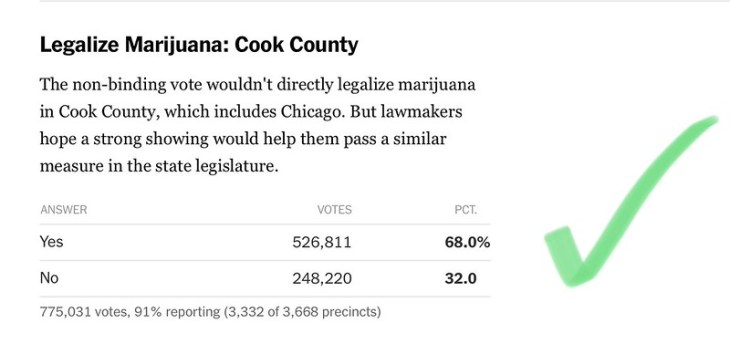
Cannabis is legal for adults to consume in Illinois as of this morning. Amazing. I’d visited Amsterdam for a week in early 1990s, so I knew it was theoretically possible for governments to allow citizens the freedom to chose whether to consume plants, but I did not think it would happen in America in my lifetime. Happy to be proven wrong.
The Chicago Tribune reports:
Lt. Gov. Juliana Stratton purchases edible gummies as Sunnyside Lakeview opens in the first minutes of legal recreational marijuana in Illinois.
…
Dispensary employees at Rise took orders from customers outside in line to speed up the process. There were outdoor heaters, and free coffee hats and gold bead medallions.
The dispensary also hired a steel drum player to play outside, adding a little “Red Red Wine” to the proceedings.
(click here to continue reading Legal weed in Illinois: First day of recreational marijuana sales begins – Chicago Tribune.)

and this is among the good outcomes to Democrats winning elections:
On the day before recreational cannabis becomes legal in Illinois, Gov. J.B. Pritzker announced he was pardoning more than 11,000 people who had been convicted of low-level marijuana crimes.
“When Illinois’ first adult use cannabis shops open their doors tomorrow, we must all remember that the purpose of this legislation is not to immediately make cannabis widely available or to maximize product on the shelves, that’s not the main purpose, that will come with time,” Pritzker said to a crowd at Trinity United Church of Christ on the Far South Side. “But instead the defining purpose of legalization is to maximize equity for generations to come.”
…
The 11,017 people pardoned by Pritzker will receive notification about their cases, all of which are from outside Cook County, by mail. The pardon means convictions involving less than 30 grams of marijuana will be automatically expunged.
Pritzker and other elected officials said they believe Illinois is the first state to include a process for those previously convicted of marijuana offenses to seek relief upon legalization of cannabis.
(click here to continue reading Pritzker pardons 11,000 weed convictions in Illinois – Chicago Tribune.)
The Chicago Sun-Times reports:
Shortly after 6 a.m. Wednesday, Renzo Mejia walked into Chicago’s Dispensary 33 and, after perusing a menu, bought an eighth of an ounce of Motorbreath OG.
With that, the West Loop resident made the first legal purchase of recreational marijuana in Illinois history.
As soon as the order processed, a cheer permeated through the small showroom floor and employees and customers embraced.
“To be able to have [recreational marijuana] here is just mind-boggling,” said Mejia, who paid about $80 for his purchase. “ … To be able to now make the first purchase in Chicago, it’s just surreal.”
To be the first, which Dispensary 33’s Abigail Watkins said was confirmed a short time after the sale by state officials, Mejia rang in the New Year in line — literally.
He took his place outside the store at 5001 N. Clark St. at 11:30 p.m. Tuesday — when the temperature was already below freezing.
(click here to continue reading 1st man to buy legal recreational pot in state history rang in New Year in line, braved freezing temps – Chicago Sun-Times.)

Block Club Chicago reports:
They began lining up at 2 a.m. in the cold, with fold-up chairs and blankets in tow. By 6 a.m., when Dispensary33 in Andersonville opened, the line, composed of people from all corners of the city and beyond, stretched for more than five blocks.
Trevor Seyller of Lakeview was first in line to buy legal recreational weed as it went on sale for the first time in Illinois. He waited four hours in temperatures below freezing for “the fun of it” — and for history.
“It’s been a long time coming, this is an historic moment,” Seyller said.
Charlie Wells drove three hours from Madison, Wis. to be among the first few in the line. He said he skipped celebrating New Year’s Eve to take part in the state’s legalization of recreational marijuana.
“It’s the end of prohibition and it’s a lot safer than drinking,” Wells said. “I’m here because my state doesn’t have it yet.”
Dispensary33 — named for 1933, the year the prohibition on alcohol was lifted — is located at 5001 N. Clark St. To help patrons battle the cold, Dispensary33 put out a few propane heating lamps along the Argyle Street.
(click here to continue reading Legal Recreational Weed Goes On Sale — And Chicagoans Line Up For Blocks In The Cold – Block Club Chicago.)
More photos of the big day at WBEZ, for instance.

Personally, had plans to go join the party and photograph people in line, but decided to wait until tomorrow or even next week to visit a dispensary. My days of being an all day smoker are long gone. Don’t get me wrong, I plan on purchasing something from a dispensary in the near future, but I didn’t feel enthusiastic enough to brave the below-freezing weather to be first in line or anything. By spring, the supply shortage should be addressed, presumedly.

Kudos to Illinois! Time to queue up the Reefer songs!



























